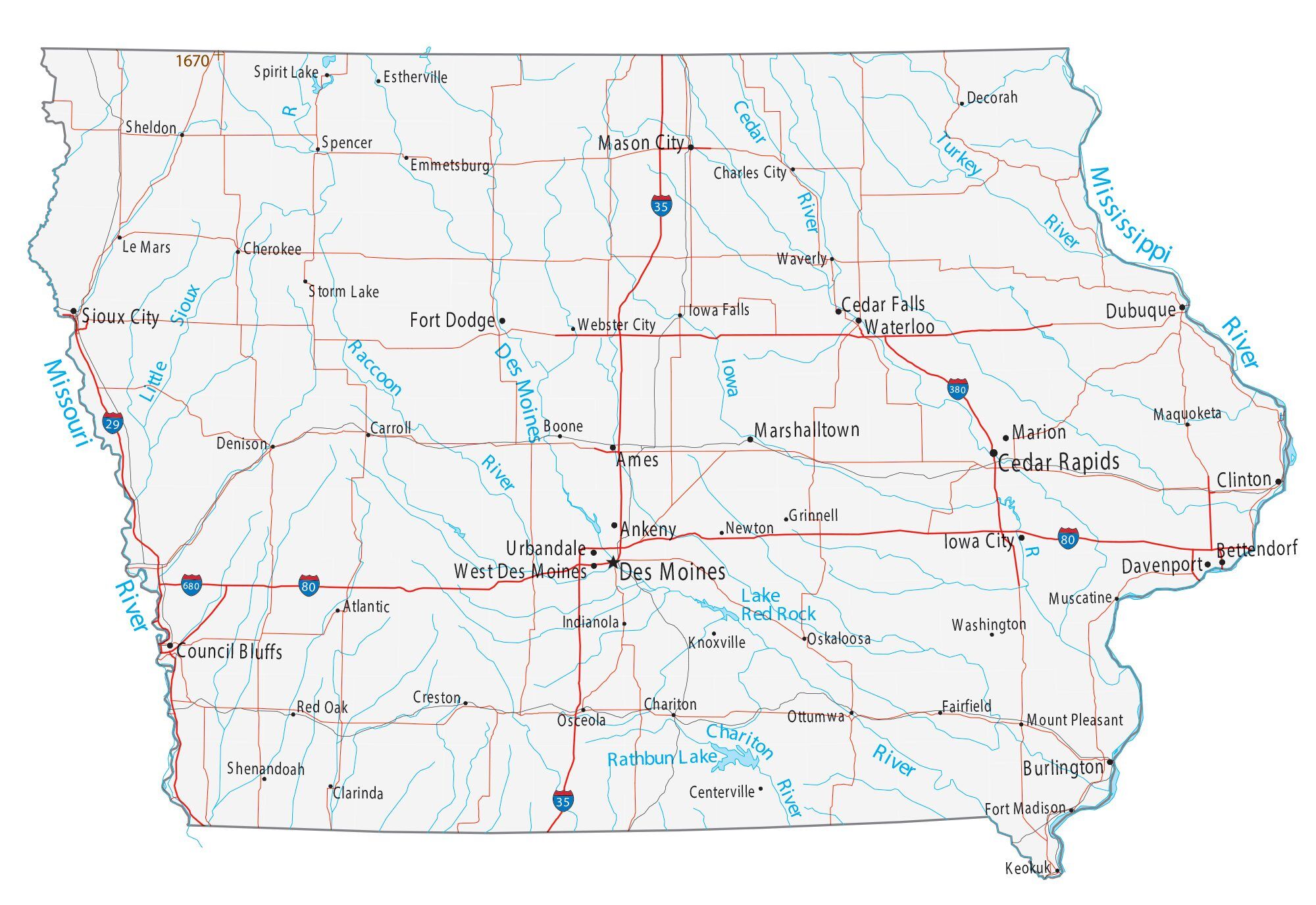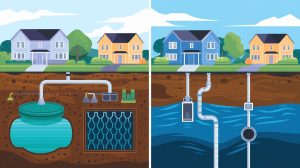Properly following Iowa septic tank laws is crucial for homeowners, contractors, and businesses. Adhering to state regulations ensures proper installation, wastewater management, and environmental protection. This article outlines the essential aspects of Iowa septic tank laws, including installation permits, wastewater disposal, costs, and compliance information.
- State-Specific Regulations Information
- Compliance Information
- Cost Information
- Local Resources & Contact Information
- Supportive Resources
- FAQs About Iowa Septic Tank Laws
State-Specific Regulations Information
Installation Permits
If you plan to install or modify a septic system in Iowa, obtaining the appropriate permits is a requirement. The Iowa Department of Public Health oversees these permits to ensure compliance with state septic tank regulations.
- Permit Requirements:
Yes, you need an installation permit. This permit ensures that your septic system installation meets state health and safety requirements. You will need to submit a detailed plan showing the system layout, tank specifications, and drain field placement. - Permit Costs:
The cost of an Iowa septic permit can vary. Typically, you can expect to pay between $300 and $500, depending on your location and the system’s scale. The costs may differ for residential and commercial properties.
Septic Tank Size and Placement
Iowa septic tank regulations have specific guidelines for tank sizing and drain field placement to ensure functionality and environmental safety.
- Tank Size Requirements:
The size of your septic tank depends on the number of bedrooms in your home or the expected wastewater volume. A standard residential septic tank in Iowa typically ranges from 1,000 to 1,500 gallons. Larger households or commercial properties may require larger tanks. - Drain Field Placement:
The placement of the drain field is just as crucial. Iowa guidelines mandate that the drain field must be located away from wells, surface water, and steep slopes. Proper placement ensures that wastewater is adequately filtered and poses minimal environmental risk.
Wastewater Disposal
Iowa wastewater rules are designed to protect public health and the environment. Proper wastewater disposal ensures that contaminants do not affect groundwater or nearby ecosystems.
- Disposal Regulations:
Wastewater must be treated through a properly functioning septic system and discharged according to Iowa Department of Natural Resources (DNR) regulations. Failure to follow these guidelines may result in environmental contamination or health hazards.
Additionally, wastewater disposal must prevent any pollutants from entering rivers, lakes, or wells.
Maintenance and Pumping
Regular maintenance and septic tank pumping are critical to the longevity and efficiency of your system. Iowa septic regulations recommend proactive maintenance to prevent system failure and environmental contamination.
- Recommended Pumping Schedules:
The general recommendation for residential properties is to have the septic tank pumped every 3 to 5 years.
The frequency depends on household size, tank capacity, and usage. Larger households may require more frequent pumping to maintain system efficiency. - Maintenance Requirements:
Regular inspections are encouraged. These inspections help identify issues early, such as cracks, leaks, or clogs, ensuring long-term system performance. Following these maintenance guidelines minimizes costly repairs and prevents contamination risks.
Compliance Information
Potential Fines and Penalties
Not following Iowa septic tank regulations can result in significant penalties. Compliance with state guidelines ensures safety and environmental protection. Here’s what you need to know:
- Consequences of Non-Compliance:
Failing to comply with Iowa septic regulations may result in fines ranging from $500 to $5,000, depending on the severity of the violation. In extreme cases, legal action may be taken, which could result in further costs and property damage. - Regulatory Enforcement:
The Iowa Department of Natural Resources and local health departments are responsible for monitoring compliance. Regular inspections are conducted to ensure that installations, maintenance, and wastewater disposal meet state regulations.
Environmental Protections in Iowa
Iowa has specific environmental protections aimed at safeguarding natural resources and public health.
- Groundwater Protection Laws:
Iowa wastewater management laws require homeowners and contractors to ensure that groundwater remains free from contamination. Wastewater treatment must adhere to strict guidelines that prevent pollutants from reaching wells or surface water. - Eco-Friendly Wastewater Solutions:
There is a push in Iowa to adopt eco-friendly septic systems that use advanced filtration methods to minimize environmental impact. These systems adhere to stricter wastewater management laws and support sustainable practices.
Cost Information
What are the Typical Costs for Septic Maintenance and Installation in Iowa?
Understanding the costs associated with septic systems helps homeowners and contractors make informed decisions. Here’s a breakdown of the typical costs:
- Permit Fees
As mentioned earlier, obtaining an Iowa septic permit usually costs between $300 and $500. The fees can vary depending on local health department regulations. - Pumping Costs
Septic tank pumping costs typically range from $300 to $600, depending on the size of the tank and accessibility. Regular pumping every 3 to 5 years helps maintain system efficiency and longevity. - Installation Estimates
Installing a new septic system can be a significant investment. Costs for installation generally range between $5,000 and $15,000. Factors that influence the price include soil conditions, system type (gravity or pressurized systems), and tank size.
Local Resources & Contact Information
For reliable and accurate guidance on Iowa septic tank regulations, it is essential to contact the appropriate state agencies and local resources.
- Iowa Department of Natural Resources (DNR)
The Iowa DNR oversees environmental protection and wastewater regulations.- Website: www.iowadnr.gov
- Contact: State Environmental Services
- Local Health Departments
County health departments handle inspections, permits, and compliance with Iowa septic regulations. Find contact information through your local county’s public health office. - State-Certified Septic Service Providers
Certified septic service companies offer inspection, installation, and maintenance services. Look for providers endorsed by local health departments or DNR certifications to ensure compliance with state guidelines.
Supportive Resources
For homeowners and contractors in Iowa, these supportive resources provide additional guidance and information:
- Government Health Department Websites
Reliable sources include local and state health department websites, where guidelines and downloadable materials are often available. - Septic Service Provider Websites
Trusted, certified septic service companies in Iowa offer online resources, FAQs, and downloadable guides. - Informational Handbooks & Infographics
Various downloadable handbooks and state-specific guides help with everything from system installation to maintenance schedules and wastewater disposal.
FAQs About Iowa Septic Tank Laws
What is required to get an Iowa septic permit?
Obtaining a permit is mandatory under Iowa septic tank laws for installing or modifying a septic system. This process ensures that systems comply with state regulations, safeguarding public health and the environment. Costs may vary by county, but they typically range between $300 and $500. Local environmental health offices or the Iowa Department of Natural Resources (DNR) are the primary agencies to contact for permit applications and guidance. For more information, visit the Iowa DNR website.
What are the inspection requirements for an Iowa septic system?
Iowa has a Time of Transfer Inspection Law, which became effective in 2009. This law mandates an inspection of the septic system before the sale or deed transfer of a property. The goal is to eliminate systems that lack secondary treatment, which pose significant environmental and health hazards. Inspection reports must be provided to the County Environmental Health Office and attached to the Groundwater Hazard Statement before any transfer. For more information, visit Iowa DNR’s Septic Inspection FAQs.
What happens if my septic system does not meet Iowa’s regulations?
If a system fails to meet current codes, it must be upgraded to meet modern wastewater treatment requirements before a property sale. Sellers are typically responsible for upgrading the system, although buyers and sellers can also negotiate who will bear the cost. Provisions exist to ensure these updates occur through binding acknowledgements with county health boards.
Are there environmental protections in place for wastewater management in Iowa?
Iowa wastewater management follows stringent guidelines to protect surface water and groundwater. Septic systems must include secondary wastewater treatment components like leach fields to prevent raw sewage discharge into ditches, streams, or lakes. Such protections are essential in maintaining healthy aquatic life and safeguarding drinking water supplies. Visit the Iowa DNR for comprehensive wastewater management guidelines.
How much does septic system pumping cost in Iowa?
The cost of pumping a septic tank in Iowa typically ranges from $250 to $500, depending on the tank size and accessibility. Regular pumping is recommended every 2 to 5 years to maintain proper system functionality and prevent blockages. Certified septic contractors handle these services, and it’s important to work with professionals listed on trusted Iowa DNR or wastewater service sites.
What local agencies oversee septic systems in Iowa?
The Iowa Department of Natural Resources (DNR) and your local Environmental Health Office handle septic system regulations and inspections. You can contact these offices to verify permits, inspection schedules, and compliance guidelines. You can find reliable contact details and resources on the Iowa DNR website.
Where can I find certified septic service providers in Iowa?
For verified professionals, check resources like the Onsite Wastewater Training Center of Iowa or the DNR website. These platforms maintain lists of certified septic service providers capable of performing inspections, installations, and pump-outs, ensuring compliance with Iowa’s wastewater regulations.
Do I need a permit for a new septic system installation in Iowa?
Yes, installing a new system requires obtaining an installation permit from your local environmental health office. This ensures adherence to regulations concerning tank size, placement, and drainage field guidelines. Permits help ensure your system complies with secondary wastewater treatment laws that prevent environmental hazards.
What penalties exist if septic system regulations are violated?
Failure to comply with Iowa’s septic system regulations can result in significant penalties, including fines and required system upgrades. Property owners might need to invest in substantial repairs to meet wastewater treatment codes. Adherence to inspection requirements, maintenance schedules, and construction guidelines helps prevent these complications.
Are there any downloadable guides or resources to help with Iowa septic regulations?
Yes! The Iowa Department of Natural Resources offers resources like inspection guidelines and homeowner advisories, accessible here. Additionally, you can find downloadable handbooks and compliance guidelines tailored to septic system installation and maintenance.
DIY Repairs Are Always Cheaper
Septic Regulations in Rural Areas: Essential Guide for Rural Property Owners
The Role of Perforated Pipes in Drain Fields
What Happens During a Pumping Service?
Septic Tanks vs. Sewer Systems | Choosing the Right Option
Directory | Virginia Septic Service Providers | Part 2







